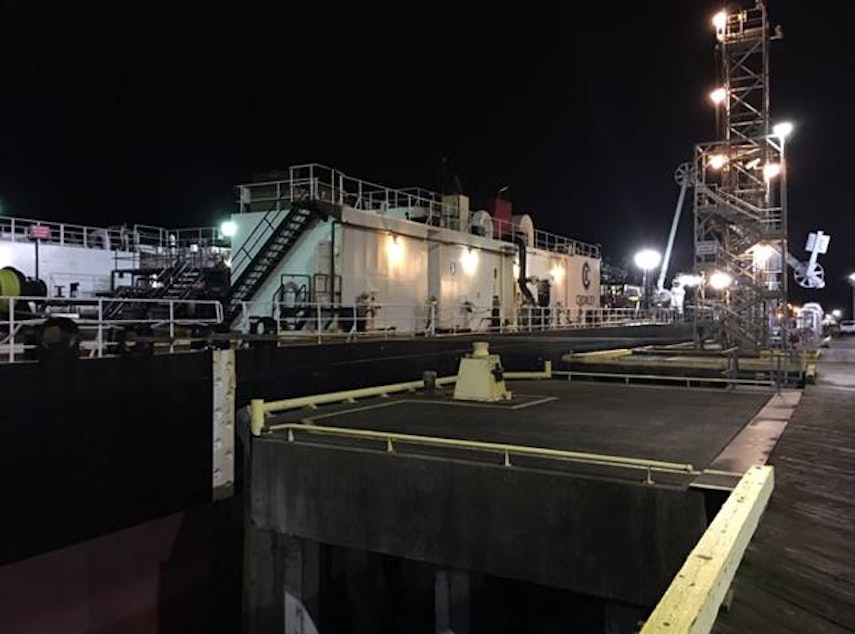Barge spills crude oil into Puget Sound

UPDATE: State officials say the barge spilled 20 gallons of oil, with just 5 gallons entering Fidalgo Bay.
A barge offloading 5 million gallons of Alaska crude oil spilled an unknown amount into the waters of Fidalgo Bay, off Anacortes, Washington, late Friday night.
According to a statement from Shell Oil, dock workers at the Shell Puget Sound Refinery noticed crude oil spilling from a Crowley Maritime barge at the refinery's dock about 11:30 p.m. and immediately stopped the offloading operation.
By morning, a sheen of oil 225 feet long and 30 feet wide had been spotted on the water.
By state law, a flexible, floating boom, designed to prevent the spread of surface pollutants, had been extended around the barge before it began offloading its viscous cargo, according to the Washington Department of Ecology.
A spill-response team unfurled a second oil-containment boom outside the first after the spill was discovered.
Ecology officials said Saturday morning they hadn't observed any oil outside the first boom.
"Responders are actively working to recover the spilled material as safely and quickly as possible to minimize any long-term impacts to the environment,” a Saturday-morning statement from Shell read.
Sponsored
Because wind and waves can splash floating oil over an oil-spill boom, the booms work best in calm waters.
Sponsored
The National Weather Service issued a small-craft advisory for northern Puget Sound Saturday morning, with southeast winds of 15 to 25 knots and waves of 3 to 5 feet forecast.
The Shell refinery’s dock is about a mile offshore, connected by pipelines to the refinery to its south.
"The latest I’ve heard is that we still don’t [know] why the spill occurred or how much but that it’s in the tens of gallons, not hundreds,” Ecology spokesperson Cheryl Ann Bishop emailed just before 10 a.m. Saturday.
"There are no reports of impacts to wildlife and it’s not big enough to impact the human health of the surrounding communities,” she wrote.
Sponsored
By midday, officials estimated that 20 gallons of crude had spilled, with just 5 gallons reaching the water.
Results of air monitoring for volatile vapors and benzene above the spill were well within safe limits for cleanup crews, according to Bishop.
Oil-spill incident command spokesperson Suzanne Lagoni said Saturday afternoon that weather had not impeded the cleanup.
“It drizzled and rained but hasn’t been windy,” she said.
According to Shell, the oil escaped from a pressure-relief valve on the barge.
The Crowley barge had voyaged from the San Francisco Bay area with crude oil from Alaska's North Slope. The barge's payload had traveled by pipeline to Valdez, Alaska, then by tanker to California before being transferred to the smaller oil barge and shipped to Puget Sound.
“Thankfully, it was a small spill,” Samish Indian Nation chair Tom Wooten said.
Wooten worked at Shell’s Anacortes refinery for 30 years before retiring.
“They do their best to keep this from happening, but it’s obvious you can’t protect against every incident,” he said. “It’s just another indicator that we need to wean ourselves off of fossil fuels.”
The Samish and other tribes in Washington and British Columbia have been fighting to prevent an expansion of the Trans Mountain oil pipeline from Alberta to Vancouver.
The expanded pipeline would bring a 60 percent increase in oil-tanker traffic to the shared inland waters of the Salish Sea, according to Canada’s National Energy Board.
A major oil spill is considered one of the gravest risks to the survival of the endangered orcas that frequent those waters.
“We are concerned we’ll see more of this type of incident,” Wooten said.
While oil trains and oil pipelines are often the subject of protests in Washington state, most of the nearly 20 billion gallons of oil refined or burned annually in the state still comes by sea, not by land.
About 650 oil tankers and oil barges head to Puget Sound ports each year from outside the state, according to the Ecology department.
Last year, oil tankers and oil barges delivered 10 billion gallons of oil to Washington state refineries.
Puget Sound's latest spill comes just one day after an annual conference on oil spill prevention in Washington and British Columbia wrapped up in Bellingham.
This story has been updated.




